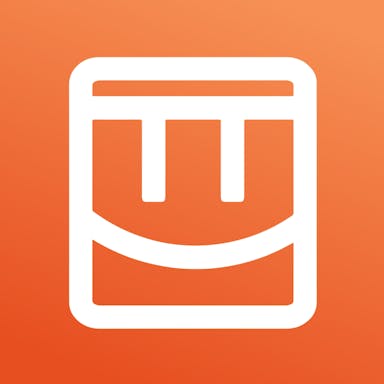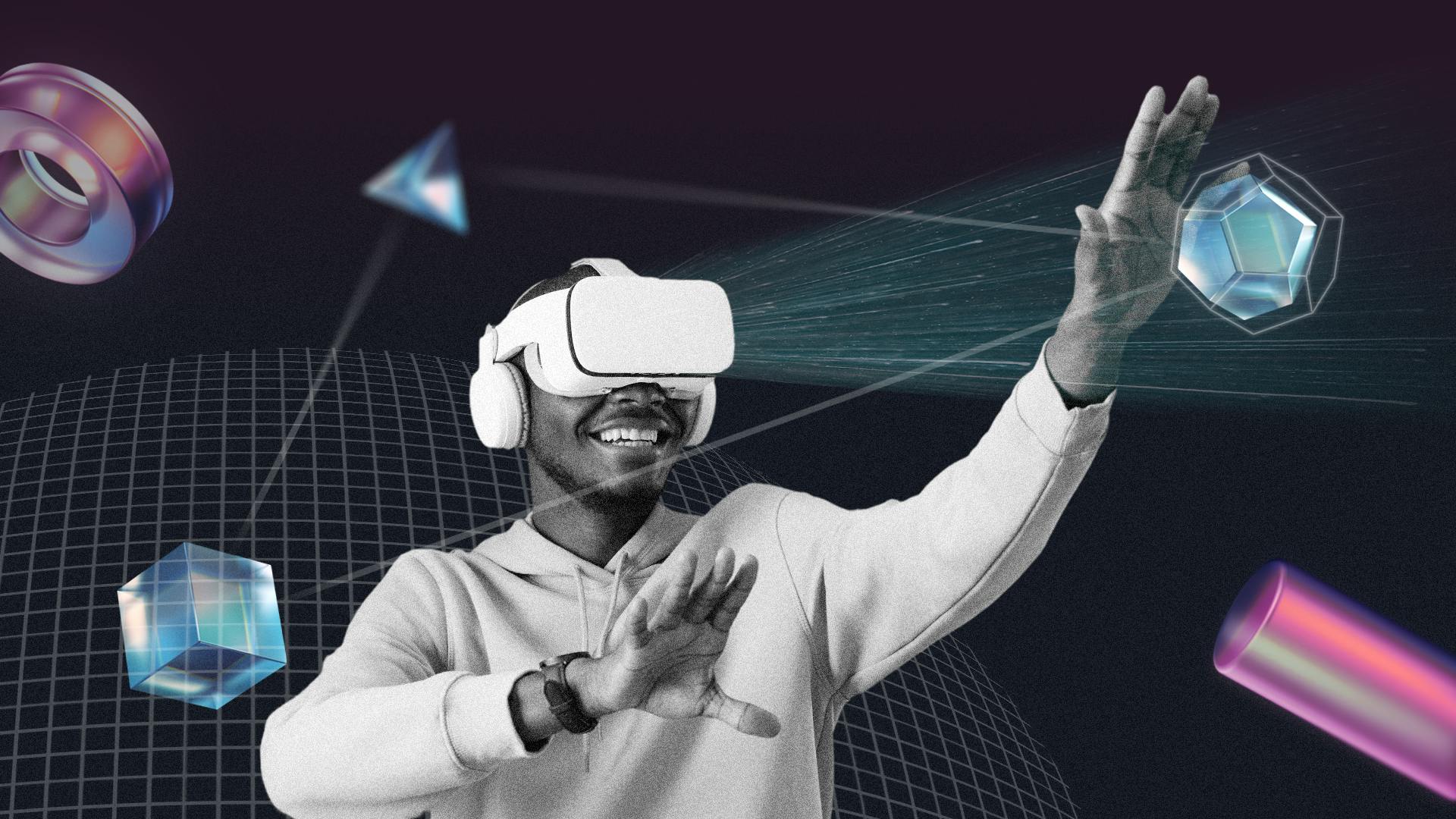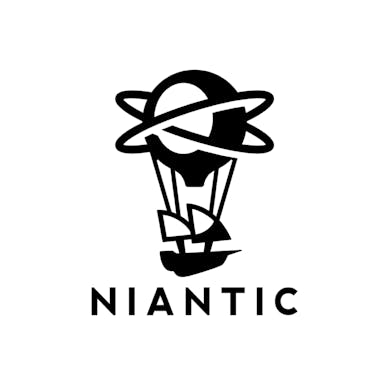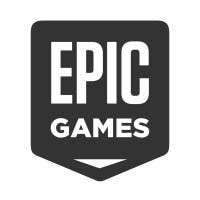Thesis
The VR gaming market was valued at $20.7 billion in 2022 and is expected to grow to $109.6 billion by 2030, growing at a CAGR of 22.7%. As of February 2024, 171 million people were using VR on a regular basis globally, a figure that is expected to reach more than 3.6 billion by 2028. Growth is being driven by increased adoption of VR among younger generations, with more than 30% of Gen Z and millennials having tried VR as of February 2024 (compared to 26% of Gen X and 13% of Boomers).
Growth in VR gaming is correlated with improving technology. In 1968, Ivan Sutherland introduced the first VR head-mounted display system, known as "The Sword of Damocles”, which laid the foundation for VR headsets. Since the release of Oculus Rift in 2016, over 230 gaming companies have entered the market, including VR consoles like Sony’s PlayStation VR and HTC Corporation’s HTC Vive. As VR technology has advanced, offering improved performance, enhanced comfort, and greater interactivity, the popularity of VR games surged.
This trend is exemplified by the actions of tech companies like Meta, Google, and Sony, who have made investments in VR game development. For instance, following Meta's acquisition of Oculus in 2019, Meta has acquired several game development studios. In 2019, Meta acquired Beat Games, the developer of Beat Saber. In 2021, Meta acquired Downpour Interactive, the studio behind the VR game Onward. In 2023, Meta completed the acquisition of Within Unlimited, the maker of VR fitness app Supernatural. The release of the Apple Vision Pro, which debuted in February 2024, is only the latest step towards spatial computing.
Rec Room is a VR user-generated content (UGC) platform that allows users to create and play VR games created by other users. Since Rec Room’s launch in 2016, Rec Room has attracted more than 82 million lifetime users as of February 2024. Rec Room is available on various gaming platforms including PlayStation, iOS, Android, and Xbox. Rec Room was built to provide a place where users can “hang out, have fun and play games with people all over the world.”
Founding Story
Rec Room was founded in 2016 by Nick Fajt (CEO), Bilal Orhan (software engineer), Cameron Brown (CCO), Dan Kroymann (server architect), John Bevis (designer), and Josh Wehrly (assistant creative director). Prior to starting Rec Room, the team of six worked together at Microsoft in the HoloLens team. Unlike VR consoles which create a 3D world for users, Microsoft’s HoloLens is an augmented reality product that superimposes computer-generated visuals in the real world.
During the founding team’s tenure at Microsoft, Fajt was the principal program manager, Bilal and Wehrly were software engineers, Brown was a creative director, Kroymann was a senior software developer, and Bevis was the team’s game designer. Together, the team worked on consumer products like video games. However, when Microsoft shifted the focus of the HoloLens to the enterprise market, several members were reassigned to different teams, with Fajt being reassigned to work on the Microsoft Edge browser. Disappointed by the inability to pursue their passion for the AR space, Fajt and his co-founders left Microsoft to form Against Gravity, which eventually became Rec Room.
At the age of 13, Fajt asked his parents for the SEGA Genesis, a video game console made by the video game company SEGA. Instead of granting his request, his parents encouraged him to earn the money to purchase the console himself. Doing chores and saving his allowance, Fajt eventually acquired the SEGA Genesis, with his first game being Sonic the Hedgehog 2. The game was transformative for Fajt. The ability for a multiplayer experience within the console coupled with real-life interactions with his friends spurred his passion for gaming. Playing multiplayer games with friends on the couch in basements became a significant part of Fajt's socialization and daily interaction with others. Fajt's childhood experience shaped his vision of a future where gaming and social interaction would be seamlessly integrated within a single world. Recognizing the potential of gaming as a social experience laid the foundation for his later involvement in creating Rec Room.
Initially, the team believed Microsoft would eventually reenter the consumer AR space, but in the interim, they decided to pursue building Against Gravity. The team was not overly attached or committed to a specific concept early on, which led to their choice of the name “Against Gravity” which had been chosen to symbolize the team’s lack of a concrete plan, as well as to symbolize the team's departure from the HoloLens headset codenamed “Gravity.” However, this lack of attachment to an idea early on laid the foundation for the company’s improvised culture that led to the gradual development of the idea behind Rec Room.
The team had identified limitations with the HoloLens, particularly regarding the lack of integration between different apps and experiences. They had seen examples like HoloTour, which offered users a 3D travel experience to famous global destinations, and HoloLens on Skype, enabling communication between individuals in virtual reality. However, these applications lacked integration and could not interact with each other. Inspired by these challenges, the team envisioned a social experience similar to Wii Sports in the VR space, pivoting away from AR due to the lack of a development kit. Instead, the opportunity to make a significant impact in the nascent consumer VR market motivated the team to start building Rec Room. They set up a workspace at WeWork in Westlake Tower in Seattle, Washington, and developed the first iteration of Rec Room in just 99 days from the initial code to its release in June 2016.
Between October and December 2017, Rec Room experienced a fivefold increase in usage, showing significant growth. Since its initial launch on the HTC Vive, the company has expanded its presence across multiple platforms, broadening its reach from just the HTC Vive to PlayStation, iOS, Android, and Xbox. This expansion has played a pivotal role in shaping the company into the cross-platform app it is today.
Product
Rec Room serves as an ecosystem where users can both engage in gameplay and create their own games. In September 2022, Rec Room launched the private beta of Rec Room Studio, an additional downloadable plug-in, to improve the creative options for creating and publishing games within Rec Room.
Gameplay and Game Creation
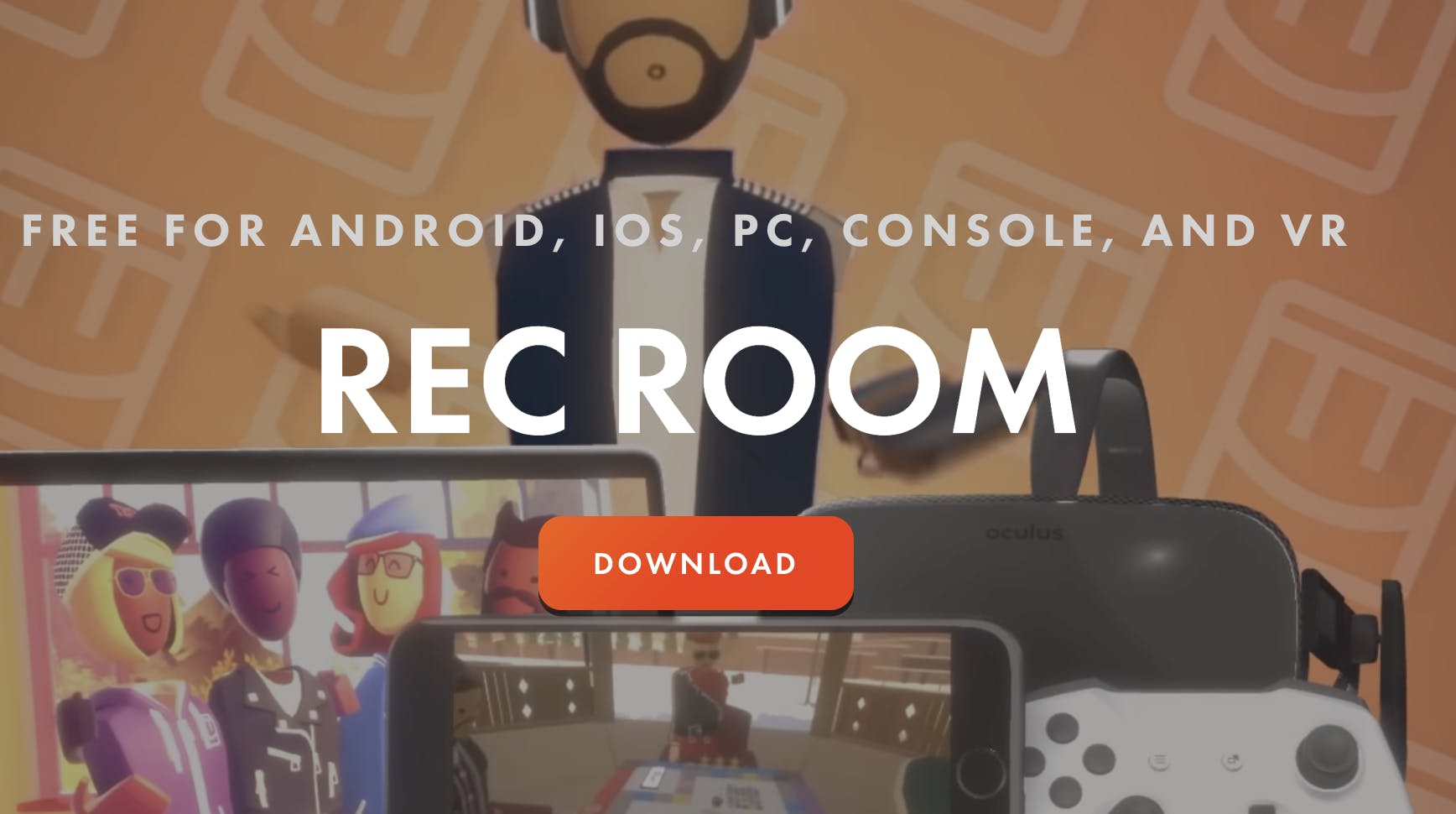
Source: Rec Room
Rec Room allows players to enter a variety of rooms where players can engage in different games. Rec Room has two main types of gameplay: Rec Room Originals and Player-Created Rooms.
Rec Room Originals: The games include first-person shooters (Paintball), a battle royale game (Rec Royale), a cooperative action-adventure game (3D Charades), various action-based quests (e.g. Golden Trophy), and various sports games (e.g. Dodgeball).
Player-Created Rooms: With this feature, users can create games using the Maker Pen. This is a tool that can be used to “create objects that consist of primitive 3D shapes (spheres, boxes, etc.) of various colors, as well as spawn in props from all of the Rec Room Original rooms.” Additionally, with Player-Created Rooms, users can play games made by other players.
When designing rooms, the Maker Pen allows players to construct their own unique rooms that can be visited by others. For instance, some players have used the Maker Pen to recreate the popular social game Among Us in Rec Room.
Rec Room also offers players the opportunity to monetize their creations through Rec Room’s Creative Commerce. However, to engage in selling creations, users are required to obtain a monthly Rec Room Plus (RR+) premium subscription. RR+ members can sell four types of creations:
Inventions: Furniture and decorative items like pets
Clothing: Clothing created by other users can be sold
Consumables: Items that players can “consume” to gain abilities to enhance gameplay. These effects could include abilities like jumping higher for a limited time in a parkour map or gaining the ability to see in the dark. Once consumed, the effects of these items are activated for a specific duration before they expire.
Room Keys: Keys can be sold to unlock certain items or experiences in Rooms.
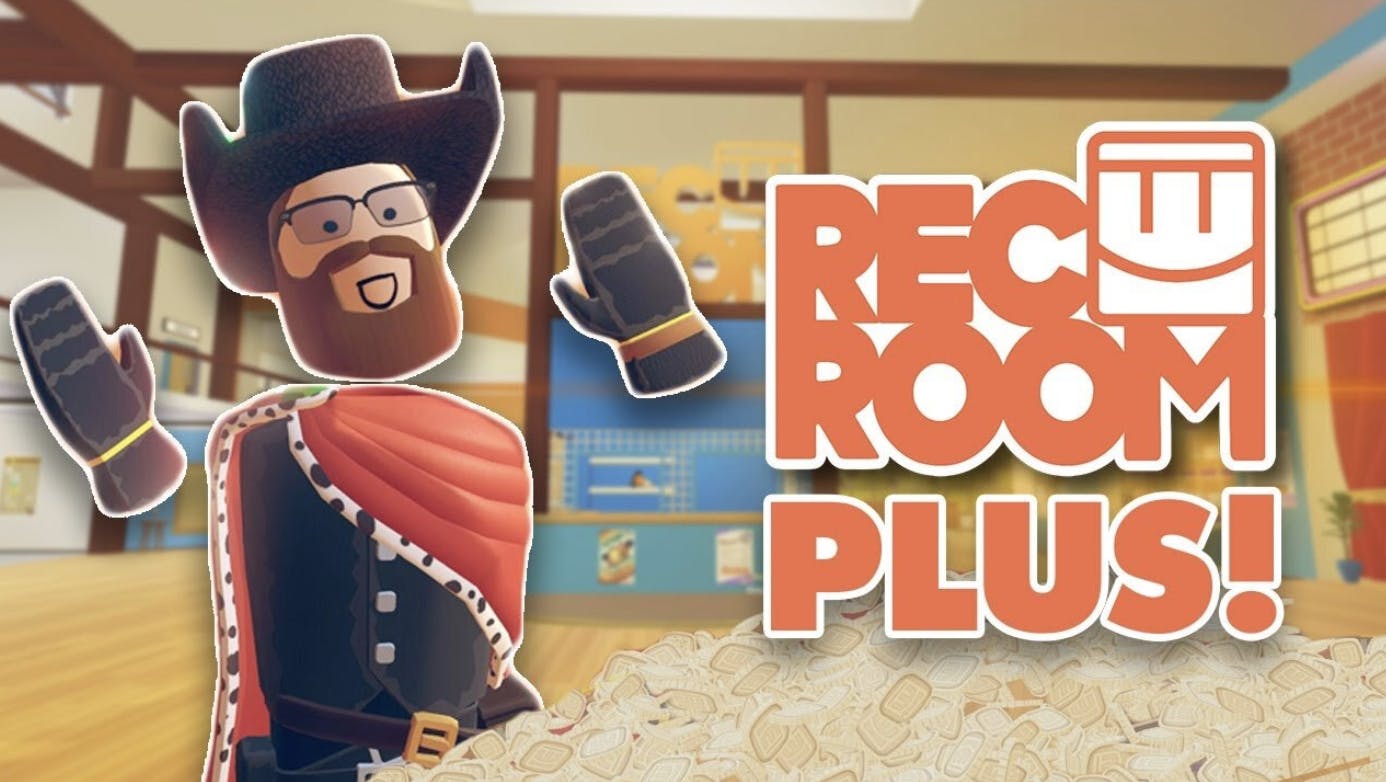
Source: Rec Room
Buyers who wish to acquire creations from other users in Rec Room are not required to be RR+ members. However, they will need to obtain tokens from the Token Shop using real currency. On the other hand, sellers who are RR+ members receive tokens once their creations are successfully sold. RR+ members enjoy the additional benefit of being able to convert these tokens into real-world cash, provided they meet certain criteria.
Rec Room Studio
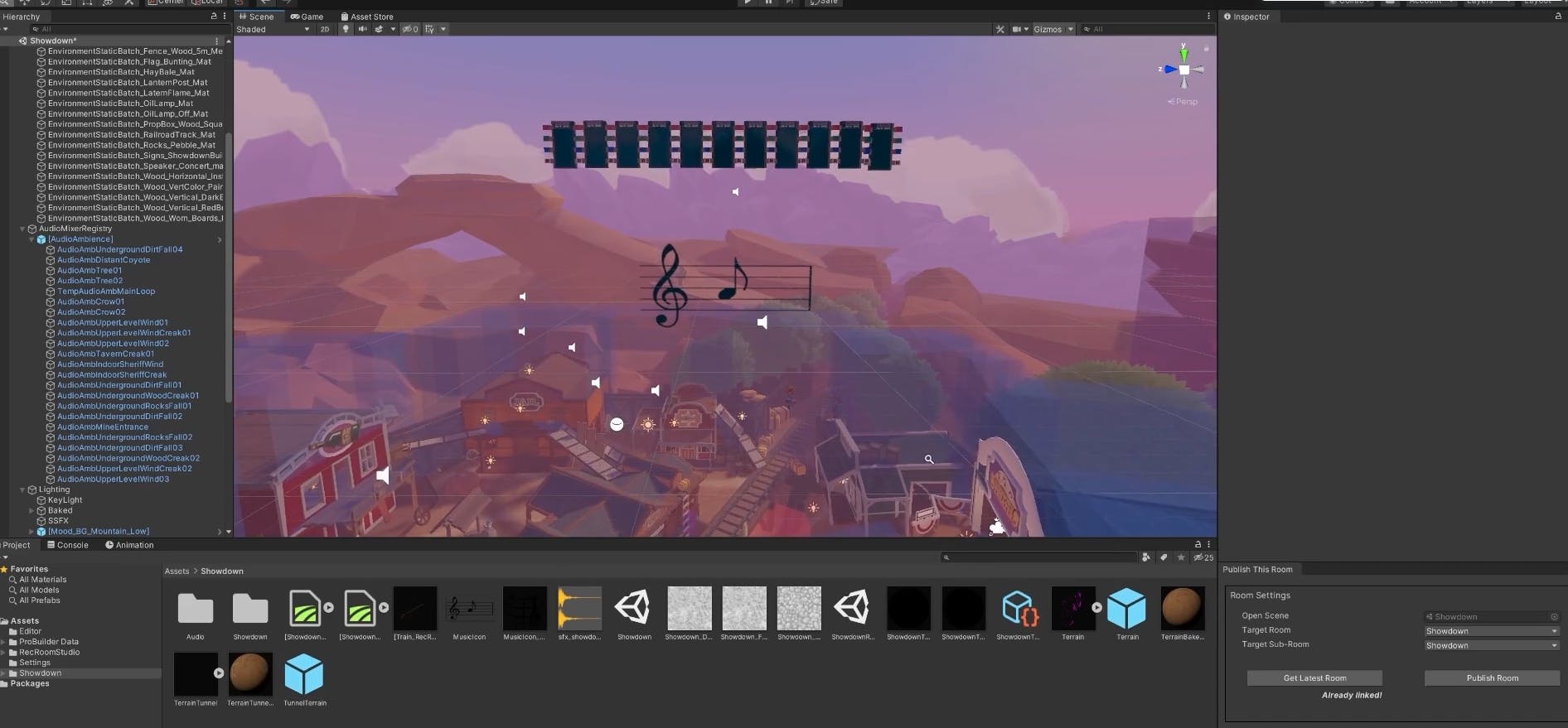
Source: Rec Room
Rec Room Studio is a downloadable plug-in that enhances the creator function of the Maker Pen. Powered by the game engine Unity, Rec Room Studio allows users to import 3D assets from software like Blender, Photoshop, and Maya, providing access to industry-standard tools compared to the Maker Pen. With Rec Room Studio, players can easily switch between the Maker Pen and professional tools and back. The integration with Unity has the potential to add more complexity to Rec Room creations. As of February 2024, Rec Room Studio is available in private beta mode only on PC.
Market
Customer
Rec Room: The primary customer audience for Rec Room is young gamers. In March 2021, Rec Room CEO Nick Fajt stated that the majority of Rec Room’s users were between 13 and 16 years old. This focus on younger gamers is evident in Rec Room’s strategic partnerships. For instance, Rec Room collaborated with Teenage Mutant Ninja Turtles (TMNT) in November 2023, enabling users to engage in themed games and dress their avatars in TMNT costumes. Rec Room also formed a partnership with Mattel in July 2023, allowing characters to dress as Barbie and Ken.
Rec Room Studio: Rec Room Studio is meant to appeal to developers who require 3D computer graphics and advanced rendering. Rec Room Studio accommodates developers who may not necessarily possess working knowledge of programming languages like Lua, while still providing access to the powerful features offered by Unity. This flexibility caters to a wide range of developers regardless of their preferred level of complexity.
Market Size
The VR gaming market was valued at $20.7 billion in 2022 and is expected to grow to $109.6 billion by 2030, growing at a CAGR of 22.7%. As of February 2024, 171 million people were using VR on a regular basis globally, a figure that is expected to reach more than 3.6 billion by 2028. Growth is being driven by increased adoption of VR among younger generations, with more than 30% of Gen Z and millennials having tried VR as of February 2024 (compared to 26% of Gen X and 13% of Boomers).
Competition
Rec Room
Rec Room directly competes against VR UGC gaming platforms like Roblox and VRChat. A key differentiator for Rec Room is its go-to-market approach as it first launched exclusively in VR but later expanded to PCs, mobile devices such as iOS and Android, and consoles including Xbox. As a result of this “VR-first” approach, Rec Room offers greater accessibility to creators across a wider range of devices.
Roblox: Roblox is a game platform developed by Roblox Corporation that allows users to play games created by other users, or create games through its creator studio Roblox Studio. Roblox Corporation was founded in 2004 and has raised $856.7 million in funding from investors like Greylock Partners, Altos Ventures, and Index Ventures.
Roblox differs from Rec Room in that it did not initially emerge as a game exclusively available in VR. Instead, Roblox focused on building its 3D universe within flat screens, primarily targeting platforms such as PCs. As a result, Rec Room is available in both VR and flat screens, whereas Roblox is primarily available on flat screens. Although Roblox is already compatible with various VR headsets, including Oculus Rift and HTC Vive, gamers need to connect their PC to a VR headset to play in VR. As of July 2023, Roblox launched in open beta on Meta’s Quest VR headsets, making it its first attempt to launch in VR. Roblox went public in 2021 with a market cap of $41 billion. As of February 2024, its market cap is $26.2 billion.
VRChat: VRChat is an online virtual world platform operated by VRChat Inc. that allows users to interact with each other through 3D avatars and explore virtual worlds created by other users. The company was founded in 2014 and has raised $95.2 million in funding from investors like HTC, Makers Fund, and Anthos Capital.
Similar to Rec Room, VRChat was exclusively available in VR at first but eventually expanded to be available on flat screens. However, VRChat seems to have been slower in expanding its availability to flat screens. As of March 2023, VRChat was still in the process of developing flat-screen ports for Android and iOS, while Rec Room had already launched on iOS in 2019 and Android in 2021. In August 2023, VRChat introduced an alpha version of its app on Android.
Rec Room Studio
Rec Room Studio competes against creative studios such as Roblox’s Creator Studio and Core by Manticore Games. Rec Room Studios sets itself apart in three aspects. First, it is powered by Unity, the most widely used engine in the game development industry with a 48% global market share. Unity's primary scripting language, C#, is better suited for DIY and indie projects compared to other scripting languages, making it an attractive choice for people just starting out in game development.
Second, unlike Roblox Studio and VRChat, which require specific programming knowledge in Lua, Rec Room Studio enables users to write scripts and build within the engine without extension coding knowledge. Lastly, Rec Room Studio differentiates itself by being a downloadable plug-in rather than a standalone downloadable creative studio, allowing for seamless integration with Rec Room.
Roblox Studio: Roblox Studio was launched in 2006 and is a separate downloadable creative studio that allows Roblox users to construct games within the Roblox universe. In 2022, developers published more than 15K games each day in Roblox. Unlike most creative studios which are powered by established game engines such as Unity and Unreal Engine, Roblox Studio is powered by its proprietary Roblox Engine.
Notably, Roblox Engine is programmed in C++, which is better suited for projects that prioritize high hardware performance. This stands in contrast to engines programmed in C# like Unity, which may not offer the same level of performance optimization. However, unlike Rec Room Studio, Roblox Studio requires developers to possess a working knowledge of Lua to write scripts, making game development less intuitive than Rec Room.
Core by Manticore Games: Core is a game platform developed by Manticore Games with an integrated game creation system that allows users to develop games and play games created by other users. Core was launched in open alpha mode in 2020 and became available in the Epic Games Store in 2021. Manticore Games was founded in 2016 and has raised $160.8 million in funding from investors like Benchmark, SoftBank, and Epic Games.
In a similar vein to Rec Room Studio, Core fosters an environment where both the creation process and gameplay unfold within the same space. This stands in contrast to Roblox Studio, which necessitates the download of a separate studio for game creation. However, unlike Rec Room Studio, Core’s target audience is more varied.
Firstly, Core is powered by Unreal Engine by Epic Games, which is written in C++. This choice of engine makes Core more suitable for developers looking to develop complex projects, setting it apart from Rec Room Studio which relies on the C# programming of Unity. Secondly, Core introduced blockchain wallet compatibility to attract Web3 developers who might be looking to create more use cases around their NFTs. Specifically, NFT owners can connect their Ethereum wallet to Core's platform, enabling them to interact with Core’s tools to create, explore, and play with their digital assets in 3D games and environments.
Business Model
Rec Room uses a freemium business model and generates revenue from two streams: Rec Room Plus (RR+) subscription and its Token Shop. Rec Room is free to download and play. The free tier provides no tokens and limits users’ ability to sell their creations in the Creative Commerce.
RR+ costs $7.99 a month and allows users to earn real money from selling creations if they meet criteria such as having at least 250K tokens earned from selling creations and more. RR+ also allows users to get 6K tokens monthly, a 10% discount in Rec Room stores that accept tokens, and exclusive access to the RR+ section of the item store. In-app purchases can only be bought through Rec Room tokens, which can be bought via its Token Shop. In the free tier, the pricing for tokens ranges from 2.5K tokens for $4.99 to 35K tokens for $49.99.
Rec Room also created their Creator Compensation Program which allows RR+ subscribers to monetize their in-game tokens for real-world cash, subject to meeting specific criteria. The payout structure involves a 30% deduction of tokens as platform fees. Users can exchange their earned tokens for money, with a rate of 250K tokens for $100. Token exchanges can be made in increments of 250K tokens, up to a maximum of 250 million tokens, once per month. Rec Room had reportedly paid out $1 million to its platform’s creators by December 2021.
Traction
In 2021, Rec Room experienced a year-on-year (YoY) revenue growth of 566%. During the same year, Rec Room also reported a significant surge in player numbers, going from 2 million lifetime players in March to 37 million by December. As of 2021, Rec Room’s users were spending around 2.7 hours per day in Rec Room, comparable to Roblox’s 2.6 hours per day in 2020.
In 2022, Rec Room’s player count as revealed at Rec Con, Rec Room's annual developer event, stood at 82 million lifetime players. In the same year, Rec Room had over 75 million downloads. Rec Room had 23 million monthly active users (MAUs) according to one unverified third-party source as of February 2024.
In terms of partnerships, Rec Room collaborated with Teenage Mutant Ninja Turtles (TMNT) in November 2023, enabling users to engage in themed games and dress their avatars in TMNT costumes. Rec Room also formed a partnership with Mattel in July 2023, allowing characters to dress as Barbie and Ken. Rec Room also formed affiliations with Tokyo Machine in August 2023, the NFL in January 2023, and Youtuber MrBeast as well as the NBA in April 2022.
Valuation
Rec Room raised a total of $294 million in funding as of February 2024, from investors including Index Ventures, Sequoia Capital, and Coatue. It raised a $145 million Series F in December 2021 led by Coatue Management at a valuation of $3.5 billion. Based on its 2021 valuation and an unverified third-party estimated revenue figure of $60 million in 2021, Rec Room had a revenue multiple of approximately 58.3x at the end of 2021.
Key Opportunities
Continuous Advancement of VR Creator Tools
Rec Room is well-suited for the emerging technologies in VR, including the continued development of VR consoles. Rec Room could identify alternative strategies to accommodate the evolving needs of creators in the VR gaming space. Looking ahead, Rec Room has strategic plans to explore the integration of AI. To stay competitive, Rec Room must ensure the continuous advancement of Rec Room Studios and ensure its features continue to resonate with the needs of creators as the industry advances.
Capitalizing Monetization Opportunities in VR
VR provides unique opportunities for monetization through exclusive content offerings. Rec Room lets creators with RR+ subscriptions sell their creations in the Creative Commerce space. However, competitors like Roblox have introduced the opportunity to monetize via ad spaces, special event passes, and paid private servers to diversify their monetization strategies. By diversifying its own monetization approach, Rec Room can have a more robust business model.
Key Risks
Game Safety
In October 2023, Rec Room filed a lawsuit against a 16-year-old user. The lawsuit alleged that the user had a six-year record of harassment and developed multiple cheat tools that allowed for workarounds. As VR video games are becoming increasingly popular with gamers with their enhanced player-driven creativity, this has also led to an influx of bad actors in such games whose conduct can negatively affect the gaming experience for other users. Rec Room’s lawsuit sheds light on the challenges faced by VR gaming companies in ensuring safety and managing user behavior. The unpredictability of users makes it challenging to eliminate disruptive elements from VR gaming environments.
Increasing Competition
Rec Room faces fierce competition from established gaming companies (e.g. Roblox and Epic Games), major tech players looking to establish their VR game offerings like Meta and Microsoft, and new players in the market. Established competitors have significant resources, user bases, and established market positions, making it challenging for Rec Room to stand out and attract users. For instance, Roblox, founded 12 years before Rec Room, boasts a significantly larger user base, with over 70 million daily active users (DAU) as of November 2023, while Rec Room only accumulated 82 million lifetime players as of 2024.
Summary
Rec Room, a VR UGC platform founded in 2016, provides users with a space to create and play VR games. Initially formed by ex-Microsoft employees disappointed by the HoloLens' shift to enterprise markets, the team's experiences led them to develop Rec Room. The company's expansion to various platforms like PlayStation, iOS, Android, and Xbox has further broadened its reach. Rec Room Studio, a plug-in powered by Unity, enhances game creation within Rec Room, offering features like importing 3D assets from software like Blender and Maya.
Although Rec Room competes with platforms like Roblox Studio and Core by Manticore Games, its integration with Unity and focus on intuitive game creation set it apart. Rec Room generates revenue through its freemium model, offering Rec Room Plus subscriptions and tokens in its Token Shop, with RR+ members eligible to sell their creations and earn real money.
